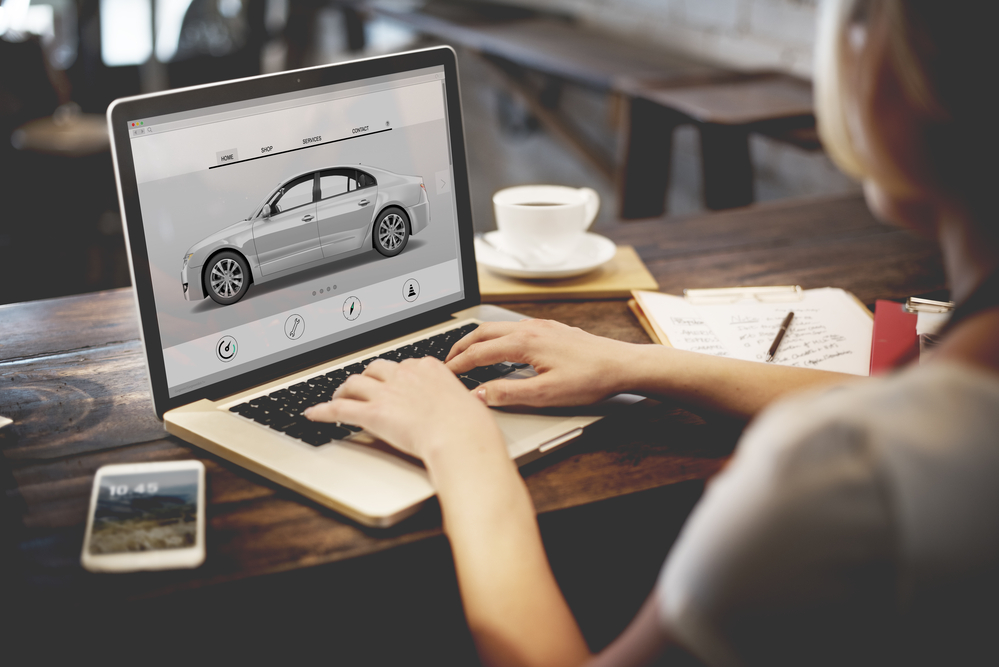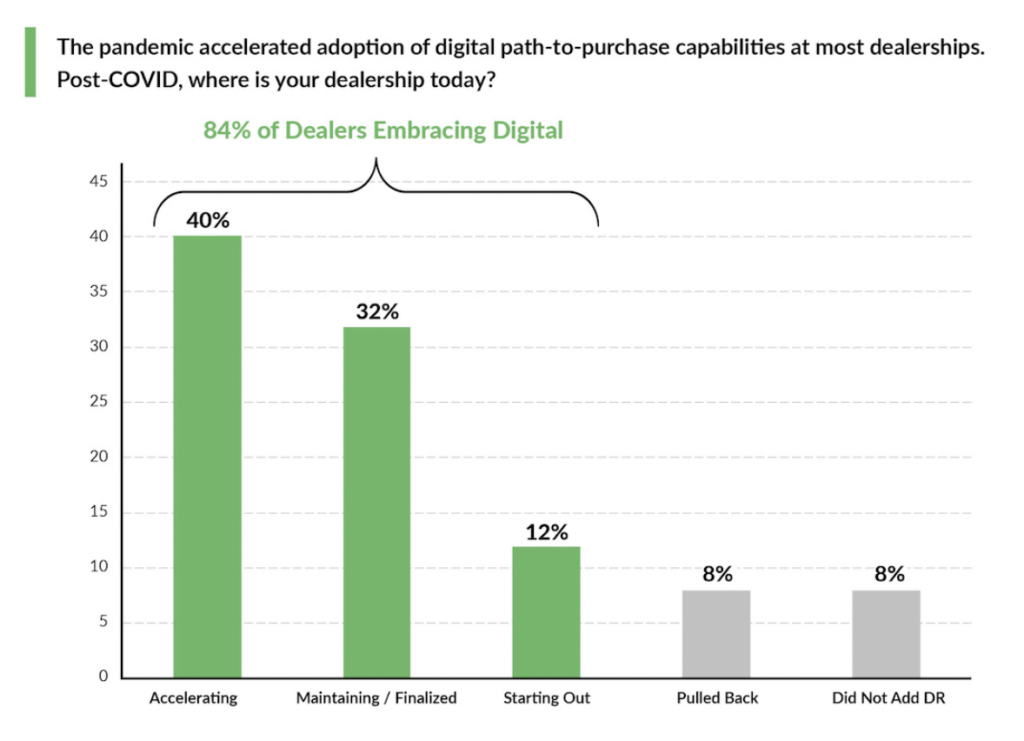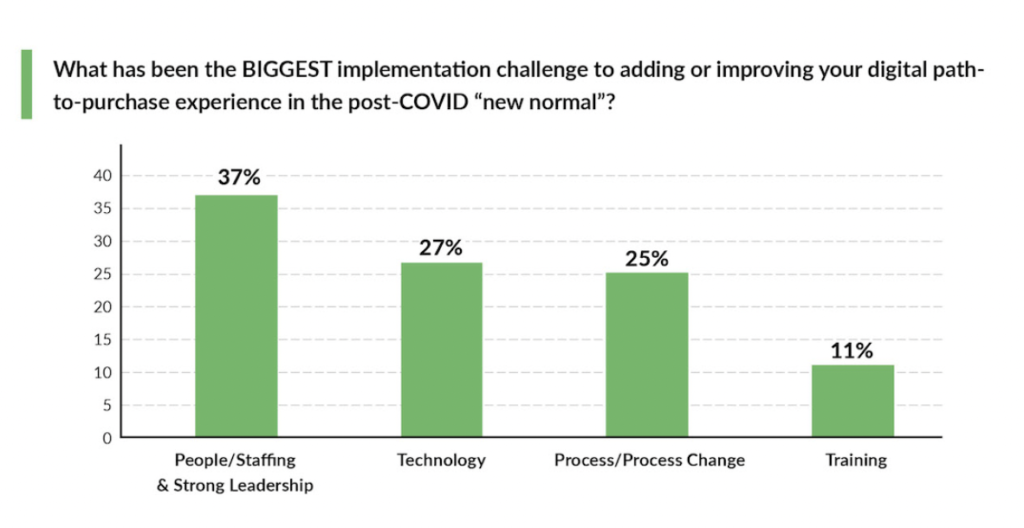 It’s human nature to seek pleasure and avoid pain. Change disrupts both. However, when the customer behaves differently and their needs change, NOT changing means inevitable extinction. The auto retail industry is now recognizing the importance of automotive digital retail, but technology has also accelerated at a breakneck speed, making it even more difficult for retailers to keep up with the curve, much less stay ahead of it.
It’s human nature to seek pleasure and avoid pain. Change disrupts both. However, when the customer behaves differently and their needs change, NOT changing means inevitable extinction. The auto retail industry is now recognizing the importance of automotive digital retail, but technology has also accelerated at a breakneck speed, making it even more difficult for retailers to keep up with the curve, much less stay ahead of it.
Many dealers have not evolved into automotive digital retailing, but that may be changing.
An interesting recent study from E-Lend Solutions shows auto dealers offering digital retailing a warm, but partial, embrace – with ongoing challenges to full acceptance of an end-to-end digital path-to-purchase
The adoption of Digital Retailing (DR) continues to accelerate in US auto dealerships as the industry moves into a new post-pandemic normal.
I talk to car people every day. I see a lot of exhausted, bewildered people who are wondering what the hell happened to their nice, comfortable retail operation. Contending with a myriad of car deal software solutions is creating frustration. Ongoing people/staffing challenges related to automotive digital retail operational changes require a rethinking of our business structure from top to bottom.
It sucks being in the middle of a transition and thanks to the pandemic, we’re all experiencing it in some way – a job change, relocating, and many relationships ending or changing. When will dealers accept the inevitable evolution to an increasingly digital buying experience?
Get my latest business tips, exclusive content, and a bit of fun straight to your inbox with the Kruse Control Newsletter. Boost your profits with our proven advice. Sign up now – it’s free!
Doing business today takes more effort than it used to but there’s no going back.
A decade ago, retailers were mainly focused on CSI and driving leads through data mining and search technology. Innovation, digital experiences and shifting consumer expectations were not even on the radar.
In 2012, dealers lacked a mobile strategy and an online presence for engaging with their customers. They had not yet adopted strategies to leverage social platforms like Facebook to advance their business goals. Consumer technology and its potential went largely ignored in dealership operations.
COVID-19 accelerated the need for digital transformation and things are not letting up. Going “back to normal” just isn’t an option.
Even the word “digital” means something different today. It was once synonymous with the IT department. Today, a dealer’s digital strategy plays an integral role in driving the goals of many departments, from sales to service to parts and even HR.
Digital transformation marks a rethinking of how an organization uses technology, people, and processes in pursuit of new business models and new revenue streams, driven by changes in customer expectations.
According to the study, nearly 80% of dealers report that past the height of the pandemic, DR-initiated transactions represented over 20% of their total retailed units, with 30% saying that DR-initiated deals represented at least 50% of their sales.
Over 84% of dealer survey respondents are embracing digital capabilities.

While it is important to note the positives, it’s interesting that the 16% of dealers choosing not to evolve, extrapolated to the universe of Franchise dealers, directionally suggests ~2,700 new car dealers in the US offer very few, if any, digital buying capabilities or tools.
In the auto retail industry, dealers who aren’t prioritizing digital retail must rethink their approach or be phased out. Certainly, there are enough disruptors coming after the retail dealership business model, so no one needs anymore impediments to survival.
What will these retailers do when their competitor embraces processes that make it easier for consumers to complete 100% of the transaction without having to visit a dealership?
How can auto retailers embrace digital transformation?
Ironically, it’s by capitalizing on the human experience. Retailers must think critically about how every digital action will affect the experiences of customers and employees. Too often, dealers focus primarily on tools and technology and this imbalance has far-reaching effects.
The biggest barriers to a successful digital transformation are people issues. Lack of leadership, resistance to change, staffing mismatches, recruitment issues, lack of digital fluency and outdated training.

Instituting the necessary digital retail technology to deliver a frictionless experience that doesn’t require a visit to the dealership is a massive undertaking and employees are at ground zero. Focusing on process, workflows and training is key.
Attention to the human experience creates better customer experiences, improved processes and ensures transformational retail operations including stronger financial performance.
Vehicle manufacturers are actively pursuing ways to deliver innovative technologies that consumers want. As a retailer, embracing innovation and evolving with digital retail will clearly help guide you through digital transformation. It will set your organization on a profitable course that will be positioned to overcome many of the challenges we see today and on the horizon.
Do you sell cars? Want to sell more? Grab your Ultimate FREE Guide to Social Media for Car Salespeople 👉 HERE.
